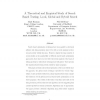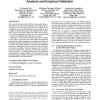18 search results - page 2 / 4 » An empirical analysis of the grouping genetic algorithm: the... |
TSE
2010
13 years 3 months ago
2010
Search based optimization techniques have been applied to structural software test data generation since 1992, with a recent upsurge in interest and activity within this area. How...
GECCO
2008
Springer
13 years 6 months ago
2008
Springer
The crossover bias theory for bloat [18] is a recent result which predicts that bloat is caused by the sampling of short, unfit programs. This theory is clear and simple, but it ...
GECCO
2000
Springer
13 years 9 months ago
2000
Springer
This paper gives a theoretical and empirical analysis of the time complexity of genetic algorithms (GAs) on problems with exponentially scaled building blocks. It is important to ...
JMLR
2012
11 years 8 months ago
2012
In this paper, we propose to apply sparse canonical correlation analysis (sparse CCA) to an important genome-wide association study problem, eQTL mapping. Existing sparse CCA mode...
GECCO
2010
Springer
13 years 10 months ago
2010
Springer
Crowding is a technique used in genetic algorithms to preserve diversity in the population and to prevent premature convergence to local optima. It consists of pairing each offsp...


